After a year of postponed ceremonies, the wedding industry is on the rebound.
With last year’s pandemic forcing the country to shelter in place, the number of U.S. weddings plummeted to 1.27 million — down from 2.17 million in 2019. But now, as restrictions lift and the world opens, more couples are ready to tie the knot.
In fact, 2022 is predicted to see 2.47 million wedding ceremonies — the most the U.S. has seen since 1984, according to The Wedding Report, a market research firm.
On top of that, a Wedding Cost Guide by WeddingWire found that couples are spending an average of $30,000 on their wedding ceremony and reception, with things like photography, flowers, food, wedding planners and venues contributing to this hefty price tag.
But that number doesn’t even include the costs outside of the bride and groom’s responsibility, such as wedding gifts, wedding attire, travel and accommodation — so it’s no wonder that the U.S. wedding services market accumulates to $56.7 billion.
But while wedding retailers are traditionally based out of brick-and-mortar stores, more couples are looking to online vendors for their needs, especially when it comes to planning. In 2020, 88% of wedding planning was done online, almost evenly split between desktop and mobile.
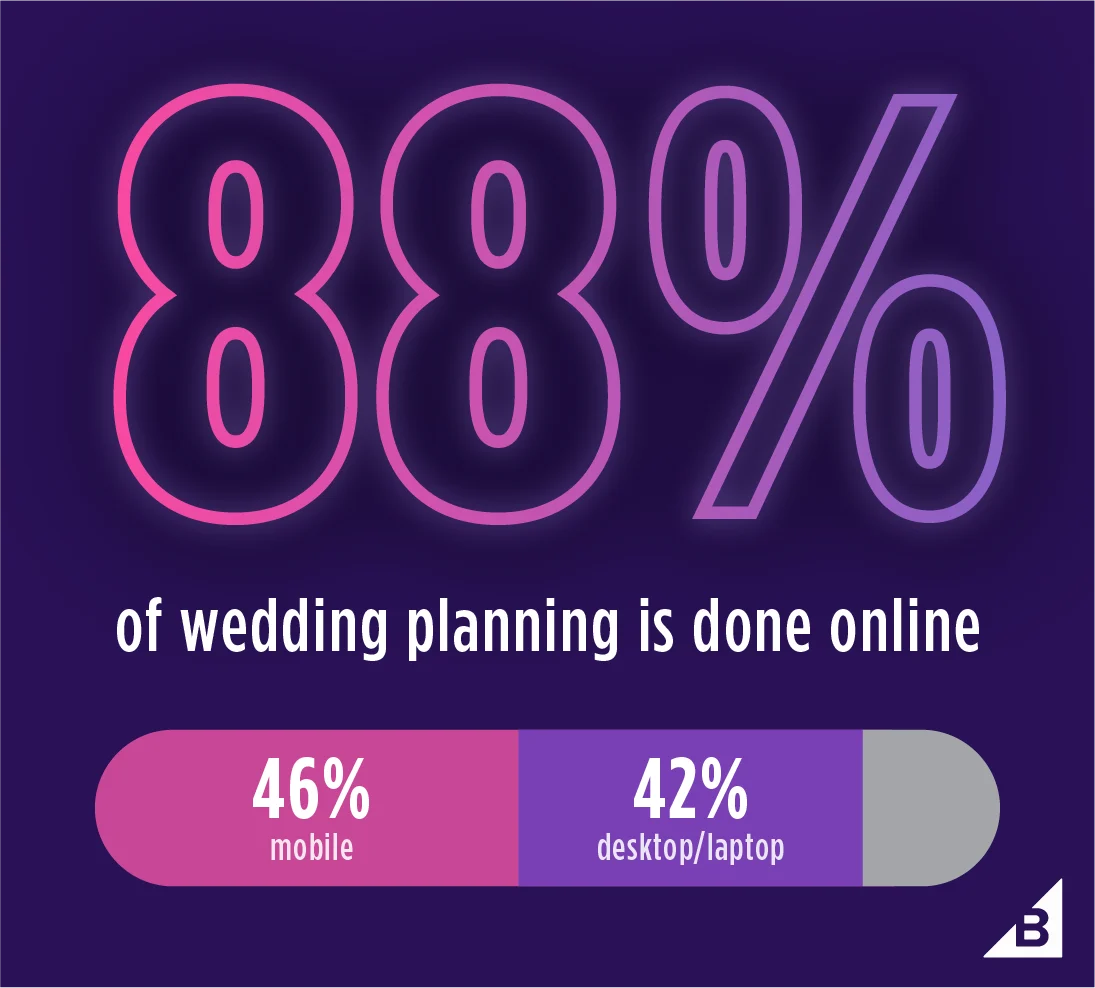
And in the midst of the pandemic, 45% of women said the pandemic impacted how they researched attire — with many conducting research online rather than visiting stores in person — while one in 10 couples met entirely virtually with their vendors.
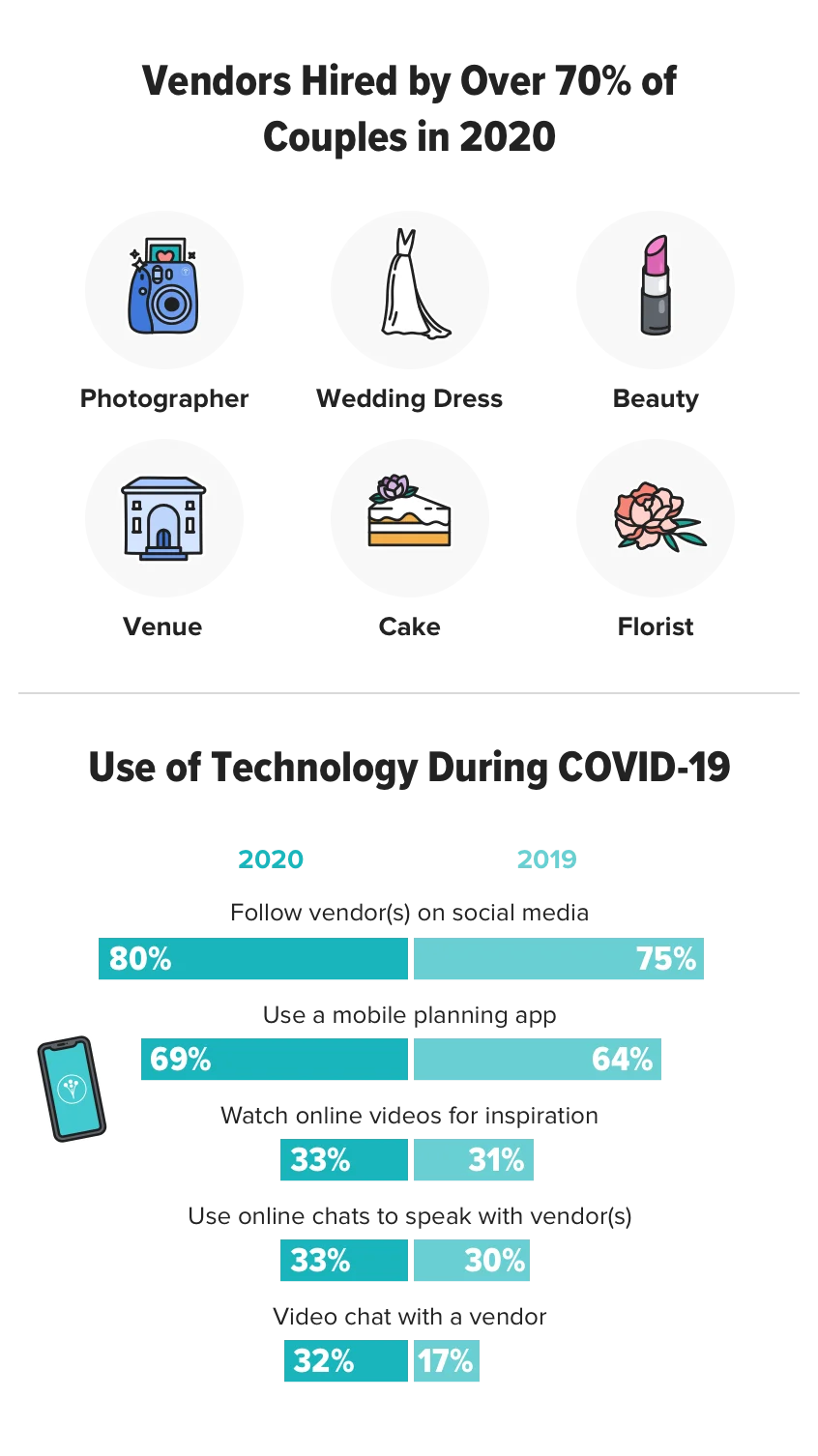
The wedding industry is stepping into a new era — one with huge opportunities for traditional vendors to reach more customers and expand their businesses. So if you’re a brick-and-mortar merchant with a wedding service or product to offer, here’s your chance to join the digital transformation.
In this guide, we’ll help you kickstart your online store, increase conversions and get inspiration from merchants that are already helping couples get to “I do.”
How to Start Your Wedding Ecommerce Website
If you’ve never built your own website before, you may be at a loss for where to begin. But no worries — here we’ll highlight four simple steps to help you guide you in the right direction.
1. Choose an ecommerce platform.
First things first, you’ll need to find the right ecommerce platform.
This is a vital first step, because every platform offers its own unique features and hosting options, and it’s important to understand the key differences in order to choose the one that works best with your wedding business. Here are just a few areas to consider when searching for an ecommerce platform:
Cost of ownership: Does the platform fit with your budget? Does the price include all the features and add-ons necessary for your business, such as web design fees, custom app creation and monthly hosting?
Flexibility: Does the platform offer unlimited bandwidth and high-traffic capabilities?
Ease of use: Does the platform offer an easy setup? Is the interface easy to navigate?
Omnichannel capabilities: Can the platform easily integrate with your social media accounts and other channels? Does it offer tools for search engine optimization (SEO)?
Scalability: As your business grows, will the platform be able to grow along with you?
Feel free to take advantage of free trials to test out several different platforms before landing on one. BigCommerce offers a 15-day free trial (no credit card required), so you can explore all of our features and decide which plan is right for you.
2. Discover your store’s niche.
In such a saturated market of wedding vendors, it can be easy to get lost in the shadow of more established retailers. Rather than diving blindly into a market, it’s important to conduct some prior research to determine whether there’s a demand for your product, who your target audience will be and competitors to look out for.
If you need some inspiration for wedding products and services, we’ll cover those in the next section.
3. Add your products to your website.
Once you’ve figured out what to sell, start adding your products to your site and build out your online store. Feel free to get creative with it and let your brand voice shine through product photography, design and messaging.
But as you’re working, keep in mind some key elements that can make or break your website:
Mobile friendliness: Make sure that your site is optimized for both desktop and mobile, so that customers can easily shop from anywhere, anytime.
Security: Ensure that credit card and other personal information is safe and secure.
Page load speed: Considering the first five seconds of page load time have the highest impact on conversion rates, keep in mind how the quality of your images may be slowing down your site.
Relevancy: Customers want content that is fresh and up-to-date, so try to do frequent checks on your social media and web content to ensure all content is relevant and timely.
4. Use social media to market your products.
Once you have your wedding website up and running, it’s time to start marketing your products — and social media is one of the best places to start. With social commerce platforms like Facebook, Instagram or TikTok, you have the potential to reach thousands of new customers and boost brand awareness. Not to mention many social platforms offer in-app checkout features, which help remove unnecessary steps from the customer buying process and create a more seamless experience.
Wedding Ecommerce Product Examples
Need some inspo for what products to sell? Here are five ideas to get your wheels turning.
1. Engagement rings and wedding bands.
It may sound crazy to purchase a five thousand dollar engagement ring online without trying it on in-store — but for the 10% who purchased rings online in 2020, the convenience outweighs the high price points.
Shopping for an engagement ring or wedding band can be daunting, especially with so many choices and such high commitment. And without seeing the ring in-person, customers may be hesitant to immediately make a purchase. But with customization features and augmented reality, you can help brides-to-be get a better picture of what a ring will look like in real life.
Or, you can even offer a try-on-at-home option, where buyers can order sample rings to try on and then send back to the store. This might help ease some apprehension about sizing and style before a customer makes a final decision.
2. Wedding day attire.
Undoubtedly one of the most important (and exciting) parts of the wedding day is the clothing. From wedding dresses to bridesmaid dresses to groomsmen suits, there is a huge demand for wedding day attire.
And lucky for ecommerce retailers, the past couple years has spurred a shift toward buying apparel online, with 61% of shoppers saying they purchased more clothing online during/after the pandemic than before.
But with this increase in fashion ecommerce comes the need for online retailers to increase their digital capabilities and differentiate themselves from competitors.
Especially for major purchases like a wedding gown or bridesmaid dress, offering a try-on-at-home sample option is crucial, since customers might be unsure about sizing and style when browsing online. Or if this isn’t an option, you could offer a virtual try-on, allowing customers to upload a photo of themselves and overlay the product on the image to get a better idea of what it will look like in-person.
3. Flowers.
You can’t have a wedding without flowers!
Whether they’re accenting the decor or part of bridal party bouquets, flowers are a central part of any ceremony, so there’s no shortage of opportunity to make sales in this market.
However, florists face a different challenge than other merchants when it comes to selling online: keeping flowers alive and intact when they’re shipped to customers. Things like weather, packaging and upkeep should be considered when going digital with your flower shop.
4. Paper goods.
When you really think about it, weddings require a lot of paper goods — custom wedding invitations, RSVP cards, name tags, wedding-day signage… So, if you love design and creating things from scratch, paper goods may be the business for you. Try getting inspiration from sites like Paper Source, which offers customizable templates for all things stationery. Play around with different designs, fonts and print methods to give your customers plenty of options when it comes time to save the date.
5. Wedding favors and gifts.
Lastly, no wedding would be complete without gifts for the newlyweds and favors for the guests. Luckily, there are numerous websites on the market that allow customers to personalize everything from bachelorette party accessories to wedding party favors. For example, The Knot, a New York-based, all-in-one wedding planning website, sells all kinds of wedding-day products, many of which can be customized with your own personal touch. Plus, the site includes community forums, where future brides and grooms can look for suggestions on hair and makeup stylists, the best place to buy the best wedding cake, local photographers and more.
Increasing Conversions for Your Wedding Ecommerce Website
Your job doesn’t end once customers reach your website — now it’s time to keep them interested. Here we’ll highlight four things you can do to increase conversions and start turning traffic into sales.
1. Clearly state return and shipping policy.
With many couples being on a tight schedule before their wedding, customers may be hesitant to make a purchase if they’re uncertain whether the product will arrive on time. Or, for high-cost purchases like wedding dresses and engagement rings, they may be apprehensive to buy if the return policy is hazy.
To help ease their worries, make sure that your website clearly states the time it takes for products to ship, and if you can, offer the option for expedited shipping. And make sure that your return policy is clearly outlined with the time window for returns, how to make a return and any associated costs.
2. Provide product specifications.
Brides-to-be often have a vision for how their wedding day will look — down to the smallest details — so it’s important that the products they order are exactly what the customer expects.
One of the most frustrating things is getting an order in the mail and realizing it looks nothing like the pictures online.
To avoid unhappy customers and complicated returns, make sure your product descriptions clearly outline the materials, sizing and color of the product. Sometimes product photos can be deceiving, so if a photo doesn’t exactly match what the product looks like in real life, make sure to point this out in the description so that customers aren’t caught off guard.
3. Include success stories.
Nothing gives brides more confidence than seeing other brides have great experiences with your business.
Of course, product reviews can help with this, too, but an even better move is to feature wedding success stories on your website. Perhaps you can have a “Wedding of the Month” section, where you feature newlyweds using your products on their big day. Use pictures, and even quotes from the Mr. and Mrs. if you can, as well as links to the products so that potential customers can start envisioning their perfect wedding.
4. Come up with unique products and services.
Finally, don’t be afraid to get creative with your products and services! In such a saturated market of wedding dresses, engagement rings and other wedding-related goods, putting a unique twist on your products is a great way to get noticed. Whether it’s offering a specific style of apparel or personalized gifts, finding your niche will undoubtedly help you stand out.
Wedding Ecommerce Sites on BigCommerce
To help you get a better picture of wedding ecommerce sites in action, we’ve rounded up some of the best BigCommerce merchants that offer wedding-related products and services. Take a look at each to see how these businesses are optimizing their online stores to help customers plan for their big day.
Icing on the Ring.
A wedding band and engagement ring retailer, Icing on the Ring began as a brick-and-mortar showroom based in Los Angeles and eventually expanded online with BigCommerce. With a collection of bridal, anniversary and fashion jewelry, Icing on the Ring offers custom-made jewelry in a variety of styles, metals and gemstones.
The website is decorated with quality product photos, including lifestyle photos of women modeling their jewelry, as well as individual shots that provide a closeup of every piece. Plus, each product includes a highly detailed description to help answer any questions a shopper may have.
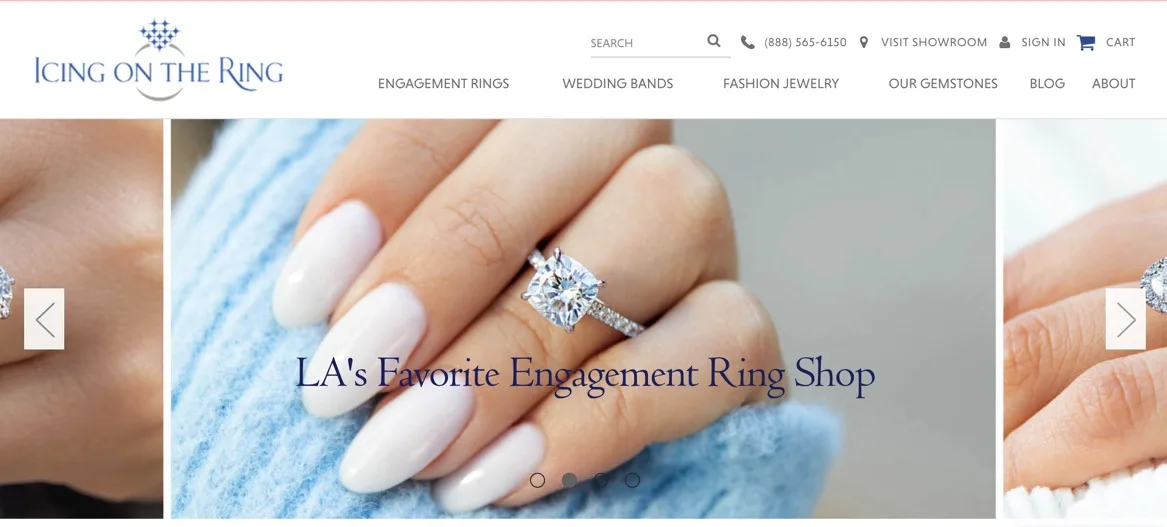
The Great Wine Co.
Although not an exclusively wedding-related brand, The Great Wine Co. offers wedding and party services to provide wine for all kinds of occasions.
With product categories for wine, champagne and sparkling, planet-friendly wines and spirits, the website makes it easy for customers to navigate and find the perfect wine for their event. And since it can be difficult to know what a wine will taste like without sampling it in-person, every product page gives a detailed description of the flavors and tasting notes.
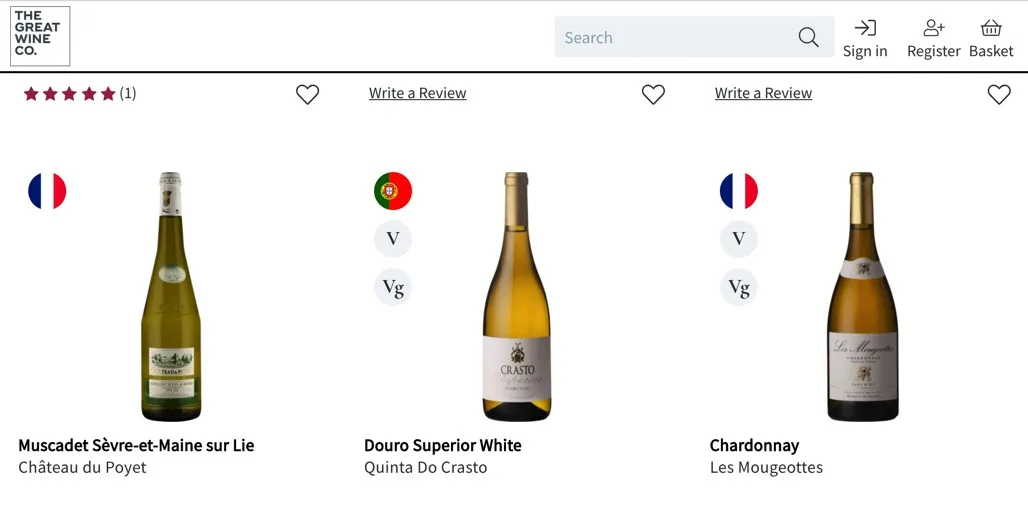
Allure Bridals.
A premier designer for wedding gowns, bridesmaid dresses and formal gowns, Allure Bridals provides an ecommerce experience that feels just as luxurious as the garments it sells.
Categorized by collection and style, Allure’s website is easy to navigate and makes it effortless to find the perfect dress. And with product photos displaying each dress in numerous angles and on various body types, brides-to-be can get a clear picture of what a dress might look like on their big day.
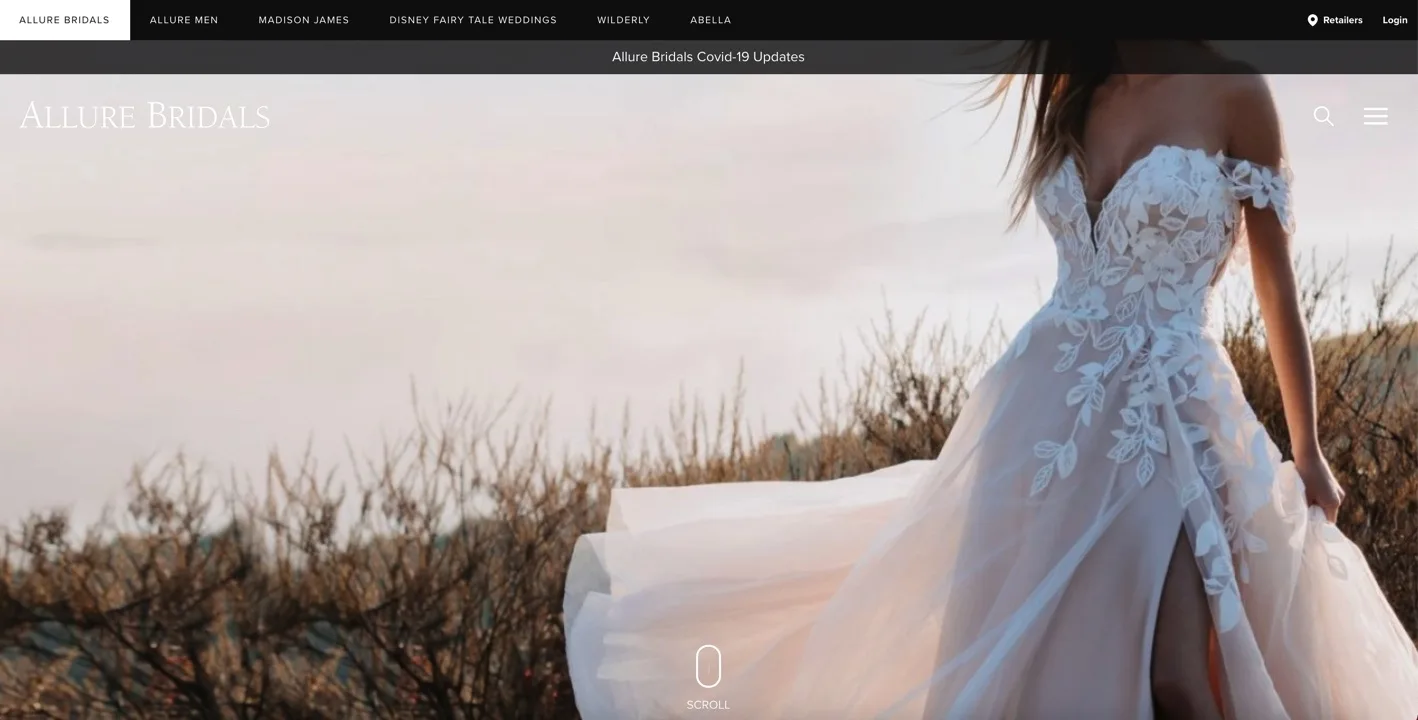
The Final Word
One of the most rewarding parts about working in the wedding industry is that you’re contributing to one of the best days of your customer’s life — so you want to give them the best experience possible. While the wedding industry may never fully go digital, there’s no doubt that it’s evolving, and if you’re a traditional, brick-and-mortar retailer, you don’t want to get left behind. To provide an online experience that’s just as good as that in-store, you need a website that allows your business to shine. And if you can marry your digital capabilities with your products and services, you’ll be sure to give your customers the wedding of their dreams.
